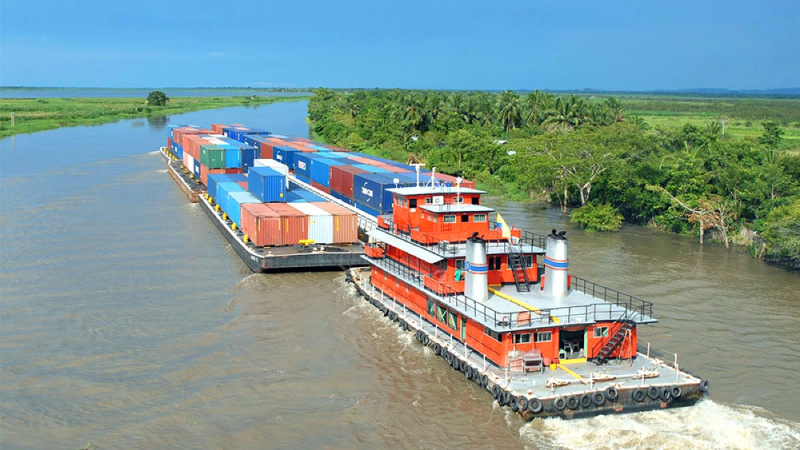Port Jennefer - on the Paraguay-Paraná waterway - is helping Bolivian businesses cut trade costs with access to the Atlantic, says its UNCTAD-trained manager.
A ship transporting cargo on the Paraguay-Paraná waterway.
The Bolivian government on 30 October awarded international classification to Central Aguirre, Gravetal and Jennefer -- three river ports on the Paraguay-Paraná waterway that connects the landlocked nation with Argentina, Brazil, Paraguay, Uruguay and, more important, the Atlantic Ocean.
Bolivia, South America’s poorest country in terms of GDP per capita, lost its coastline to Chile after the 19th-century War of the Pacific.
The port reclassifications come just one month after the International Court of Justice ruled that “…the Republic of Chile did not undertake a legal obligation to negotiate sovereign access to the Pacific Ocean for the Plurinational State of Bolivia”.
According to managers of the ports – all members of UNCTAD’s TrainForTrade Port Management Programme – the waterway offers an alternative route to the sea.
“The hope, the opportunities that the Paraguay-Paraná waterway offers business owners and Bolivia’s economy are considerable,” Bismark Rosales, manager of Port Jennefer, says.
He says more businesses can save time and money floating goods up and down the waterway instead of hauling them across the Andean Mountains that stand between Bolivia and Chile’s ports on the Pacific.
“In terms of freight costs, the reduction is around 18-20%. And for time, it’s up to 30%,” says Mr. Rosales, Bolivia’s first graduate of UNCTAD’s programme.
“We’re talking not only about the development of a port or a region. We’re talking about the development of an entire country.”
High transit fees
Mr. Rosales says the rugged terrain means that when exporting or importing goods via the Pacific Ocean, the transit costs for the Chilean-Bolivian leg of the journey are often the most expensive part of the voyage.
The roads leading to Arica Port near the Chilean-Peruvian border, for example, wind up and down the Andean Range climbing from 300 to over 5,000 metres above sea-level.
“This is why Bolivia hasn’t been able to be competitive in the international market – because of a logistics problem,” he says. “It’s not because our products are of poor quality.”
110,000 containers
According to the Chamber of Industry, Commerce, Services, and Tourism of Santa Cruz (CAINCO), the country’s largest city, Bolivian businesses import 110,000 containers through the Chilean port of Arica each year.
Some of these containers can now be brought up the Paraguay-Paraná waterway thanks to the river ports’ new international classification.
Port Jennefer, located on the Tamengo Canal, currently moves about 500,000 tons of cargo – mainly soybean flour and oil. But the port’s managers expect this figure to quickly double.
Mr. Rosales credits UNCTAD with preparing the port for the more prominent role it will now play in Bolivia’s economic development, and for helping to turn the option of the waterway into a reality.
“We’ve always talked about the option of the waterway, but perhaps we did so in an independent, separate manner,” he says.
“One of the greatest successes of the UNCTAD program was to bring us together – the government with the private sector – to unite efforts and have the same vision for our ports.”
He also says that the training courses have improved his knowledge of port management and are helping his team build the skills they need to operate Jennefer as an international port.
“We’re the first international port in the country thanks to this support and to the knowledge acquired through the UNCTAD program.”
200 ports
The TrainForTrade Port Management Programme has worked with more than 200 ports in 34 countries. More than 3,000 officials have graduated from the programme since it started in 1996.
In the Latin American and Caribbean region, the programme is active in Argentina, the Dominican Republic, Guatemala and Peru – in addition to Bolivia.
TrainForTrade is supported by the ports of Nantes and Marseille in France, Dublin and Cork in Ireland, Belfast in the United Kingdom of Great Britain and Northern Ireland, and Gijon and Valencia in Spain. It also receives funding from Irish Aid, Ireland's official agency for international development.

